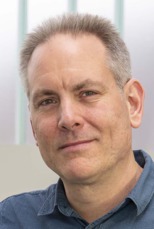Growing up as a teenager in the 80’s, I witnessed the birth and rise of personal computers firsthand. The Commodore 64 was the first computer to enter our home, and apart from the myriad games we played endlessly, it also made me experiment with BASIC (and basic) programming. Despite my early engagement with computing, at school I was more interested in languages and media (I also wasn’t strong enough in maths). So, when it was time to go to university, I chose to study communication sciences at the Faculty of Social Sciences at KU Leuven, Belgium.
During my studies, my interest in computers never faded, especially as it coincided with the rise of the Internet and the start of the World Wide Web—an evolution I eagerly followed. A course in communication technology taught by an engaging lecturer, professor Dirk De Grooff, made me choose a thesis topic on networked virtual reality (VR) with him as advisor. That choice had a profound impact on my future career. My advisor had created a spin-off company that produced interactive CDs (CD-i, the predecessor of CD-ROMs and DVDs) where he offered me a student job. Professor De Grooff had also founded an educational center within the faculty for teaching new technologies to various audiences. As I finished my studies, the coordinator of that center had just left, and I was offered the job.
At the center, I had a wide variety of tasks, including teaching HTML to students in communication sciences, introducing 16-year-olds to VR and other new technologies, and setting up and managing a small computer network (first Macs, later Windows PCs). I also took over organizing courses for companies on the topic of human-centered design, which was my first introduction to a field that up to then was unknown to me. After a couple of years teaching about a wide range of new technologies, I felt the need to specialize more, and my advisor inspired me to pursue a Ph.D. It took me about a year of searching for a topic that really matched my interests, but I finally found it as interactive television began to take off: I wanted to study how interactive TV could be used in a social context. This combined two of my interests: (the use of) technology and media.
While pursuing my Ph.D., my professor started a research center with me as research manager. It went through various name changes: the Centre for Usability Research, the Centre for User Experience Research, and finally the Meaningful Interactions Lab (Mintlab). As the research group grew, so did my knowledge of and passion for human-computer interaction. With my background in communication and social sciences, fields strongly rooted in studying and understanding human behavior, it became a mission for me to advocate for including people in the design process as early and often as possible.
While I spent most of my career at the university working on collaborative research projects, my entrepreneurial advisor also helped me get some experience in industry. As our research group regularly got commercially oriented questions from companies (for example, for evaluating the usability of their products), we co-founded a company (U-Sentric) together with Annita Beysen, an experienced manager who had studied with Professor De Grooff. In my free time, I participated in some of their projects, gave workshops on human-centered methods, and provided strategic advice based on new evolutions I picked up at various conferences.
The biggest step in my career, however, took place because of personal reasons. My wife is Portuguese and wanted to return to Portugal in the summer of 2024. Although I still loved my job at the university and was in the midst of managing an interdisciplinary research institute there (the KU Leuven Digital Society Institute), I was also feeling the need for a change. So, I left my job and took the leap to start as a freelancer in Portugal, combining my skills, experience, and passions: training, consulting, and writing proposals on topics related to artificial intelligence, the newest evolution in technology, which is in dire need for a human-centered approach.
One constant I see throughout my career is that I was mostly surrounded by inspirational people who supported and motivated me to pursue my interests and passions. They also reinforced my belief in cooperation instead of competition as the best way to grow and move forward, which I tried to pass on to the people I worked with as research manager. Although I am now older, more experienced, and working as a freelancer, I think it is important to still connect with other people, ask for their help, and join forces. A career is not built solely by yourself, it is the people around you who help you build it.
Name
David Geerts
Background
Human-centered design of interactive media for 28 years.
Current Job Title/Employer:
Freelance human-centered ethical AI expert since 2024.
Education:
Ph.D. in social sciences and master’s in communication sciences, KU Leuven, Belgium.





Join the Discussion (0)
Become a Member or Sign In to Post a Comment